View As Webpage | View Archives | Email a Friend
| |
| |
 |
 |
| |
 |
|
@{mv_date_MMM d, yyyy}@ |
|
| |
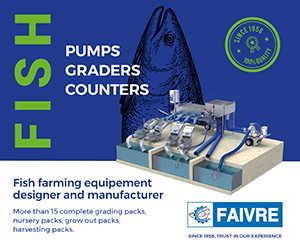 More than one per cent of the catfish fillets from each harvest is rejected by processing plants due to diffuse red discolouration in the fillet. Per 2019 data, the estimated annual loss was US$683,000 for catfish processors. In the study by Shay S. Keretz et al., “Effects of Aeromonas sobria on physiology and fillet quality of market-sized channel catfish,” fillets from channel catfish inoculated with bacteria A. sobria demonstrated redness values similar to that of the catfish fillets rejected by processors.
» Read more
More than one per cent of the catfish fillets from each harvest is rejected by processing plants due to diffuse red discolouration in the fillet. Per 2019 data, the estimated annual loss was US$683,000 for catfish processors. In the study by Shay S. Keretz et al., “Effects of Aeromonas sobria on physiology and fillet quality of market-sized channel catfish,” fillets from channel catfish inoculated with bacteria A. sobria demonstrated redness values similar to that of the catfish fillets rejected by processors.
» Read more
Land-based salmon producer Atlantic Sapphire, global animal feed company Skretting, and algal oil producer Veramaris are working on a project to cut fish oil content in salmon feed. The Florida-based aquaculture company announced that it has agreed to include Veramaris ASC-MSC-certified sustainable algal oil in its salmon feed beginning in the fourth quarter of 2021. The move will cut fish oil content in Atlantic Sapphire’s salmon feed by approximately 25 per cent and accelerate the elimination of marine-derived feed ingredients by 2025.
» Read more
Nofima researchers and partners have announced the development of a promising method to sterilise salmon, which they’ve been working on for several years and further, can document that sterile salmon are just as healthy as fertile salmon. There’s been a demand for sterile farmed salmon, as this can limit the impact of escaped farmed salmon in rivers; additionally, sterile salmon production will contribute to improved meat quality, less disease, and lower mortality.
» Read more
|
| |
|
| |

Our changing climate and growing population challenge the world’s food supply, especially in aquaculture, which is more prone to problems associated with climatic variability. Innovative scientists are turning to advanced genomic tools to enhance the production efficiency, sustainability, product quality and profitability of aquaculture. They’re partnering with LGC, Biosearch Technologies to help optimise their workflows for maximum genetic gain using a modern agrigenomic approach.
» Learn more |
| |
|
| |
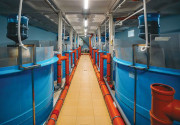 Onsite oxygen generation systems have become a popular choice for many operations, especially remote sites. Maintaining the generating units is one of the most important tasks onsite, given their vital nature. Being proactive by having a good monitoring program and having vital spare parts on hand is the best way to minimize both downtime and maintenance costs.
» Read more
Onsite oxygen generation systems have become a popular choice for many operations, especially remote sites. Maintaining the generating units is one of the most important tasks onsite, given their vital nature. Being proactive by having a good monitoring program and having vital spare parts on hand is the best way to minimize both downtime and maintenance costs.
» Read more |
| |
|
| |
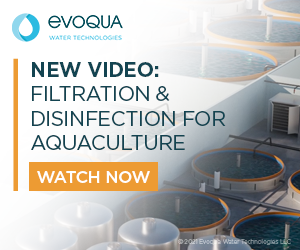
From RAS to transporting fish in well-boats, highly controlled water conditions are critical for long-term, productive growth. Discover how Evoqua’s range UV, Ozone, and Filtration system technologies can be applied across the aquaculture industry to achieve optimal water conditions, while ensuring sustainable operations for fish health and improving your yields and quality. Weather you’re looking to maximize the efficiency of your RAS system or improve the hygiene of your Evoqua’s leading solutions help boost the performance of the aquaculture industry.
» watch video |
| |
|
| |
The Kazakh Ecology Ministry has approved a draft decree under which fish farmers can get a 50 per cent reimbursement for the costs of broodstock in 2022. These new measures are part of an ambitious aquaculture development program embarked on by the Kazakh government in 2020. The main goal of which is to ramp up the domestic farmed fish production from 7,000 tonnes in that year to 270,000 tonnes per year in 2030.
» Read more
|
|
Graintec and ImpactMarine have announced a strategic cooperation agreement for the development and construction of an international portfolio of land-based aquaculture facilities. The partnership will help speed up the development of ImpactMarine’s pipeline of controlled environment aquaculture business using recirculating aquaculture system (RAS) technology, which will allow the company to produce various species for distinct markets. For Graintec, the partnership will give the company an opportunity to expand the deployment of its RAS technology into new markets.
» Read more
» Read more
| | |
|
| |
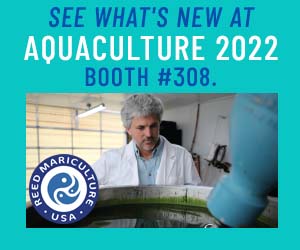
|
| |
|
| |
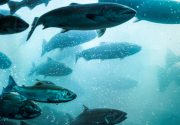 Managing water quality and preventing disease from affecting your yields is a complicated process that can involve many different technologies and solutions. To help companies protect against waterborne infection and disease, Evoqua recently hosted a webinar dedicated to understanding and improving water quality in land-based hatcheries. In addition to sharing some expertise, Evoqua has compiled detailed answers to our eight most frequently asked questions when it comes to solutions the company can provide for the aquaculture industry.
» Read more
Managing water quality and preventing disease from affecting your yields is a complicated process that can involve many different technologies and solutions. To help companies protect against waterborne infection and disease, Evoqua recently hosted a webinar dedicated to understanding and improving water quality in land-based hatcheries. In addition to sharing some expertise, Evoqua has compiled detailed answers to our eight most frequently asked questions when it comes to solutions the company can provide for the aquaculture industry.
» Read more |
| |
|
| |

Mar. 30-31, 2022
Hilton Head Island, South Carolina, USA
» Read more
|
| |
| |
&cm1=1)
|









